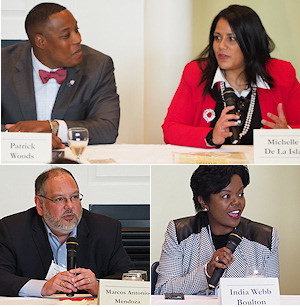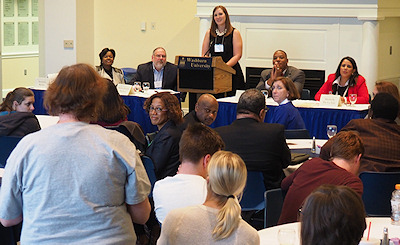BTLC Hosts Diversity in the Corporate Sector Panel
 Washburn Law's Corporate and Law Firm Diversity Symposium held in March 2016 began a conversation at the law school about diversity in these sectors. To continue the conversation begun during that symposium about ways to achieve diversity and inclusion, the Business and Transactional Law Center sponsored "Diversity in the Corporate Sector: Beyond the Symposium" on Thursday, October 13, 2016. The panelists included:
Washburn Law's Corporate and Law Firm Diversity Symposium held in March 2016 began a conversation at the law school about diversity in these sectors. To continue the conversation begun during that symposium about ways to achieve diversity and inclusion, the Business and Transactional Law Center sponsored "Diversity in the Corporate Sector: Beyond the Symposium" on Thursday, October 13, 2016. The panelists included:
- India Webb Boulton, '99, Vice President-Law/Marketing Practices, Sprint Corporation
- Michelle de la Isla, Diversity and Inclusion Representative, Westar Energy
- Marcos Antonio Mendoza, '89, Assistant Director, Legal and Regulatory Affairs, Texas Association of School Boards
- Patrick Woods, Director of Talent Management & Diversity, Westar Energy
The program was moderated by Amanda Kiefer, '03, First Vice President, Director of Human Resources and Minority and Women Inclusion, Federal Home Loan Bank of Topeka.
The panel began by discussing why diversity is important, and then discussed how to attract and retain diverse individuals. The panelists finished their remarks with advice regarding how to make mentorships valuable and effective.
As the panelists explained, diversity is important not only because it is the right thing to do, but also because customers and workforces are changing. Given that the nation is experiencing a demographic shift, if corporations only look at the way they currently exist, they set themselves up for failure. Instead, the panelists suggested that corporations must focus on the people they serve and mirror their community to create credibility. That way, as a significant percentage of the workforce retires in the coming years, their replacements will be more diverse. The panelists also talked about ways in which cultural diversity causes us to be smarter by forcing us to interact with people of other perspectives. They pointed out that this variety of input leads to smarter decision-making and a better bottom line.
To attract and retain diverse individuals, panelists suggested that executives need to develop choice architectures to take the decision-making out of managers' hands. They outlined three steps: First, decide where to set the bar based on what the corporation needs, not what the interviewers like. Second, take a step back and look at the available pool of candidates. In this respect, the corporation may need to help educate the workforce to grow the pipeline. Engaging the community and building relationships also helps expand the pool. Third, hiring managers should not focus on cultural "fit" if the concept of "fit" results in those managers simply hiring people like themselves. The panelists suggested the three steps will help individuals avoid their unconscious biases and challenge the false dichotomy between diversity and high quality, thereby benefitting businesses.
In addition, several panelists pointed out that law firms can have a problem if they do not provide management training for lawyers. The result may be that there are many "accidental managers" who need additional training for their leadership roles, particularly with respect to mentoring. Because mentoring is difficult, the panelists suggested that law firms, like businesses, may need to persuade their attorneys to mentor others and then reward them for helping people improve. The panelists suggested that in some cases mentorships should be short to keep them intense. And regardless, the panelists emphasized, mentors should be people who are where their mentees want to be, regardless of what they look like or their gender.
In conclusion, each member of the panel offered a final piece of advice. De La Isla reminded attendees that shared vision and leadership start at the top. Mendoza told students that if they see a job and it does not "look like them" but they want it, they should apply anyway. Woods recommended that job applicants find ways to show that they are willing to commit themselves to something greater. Kiefer shared that the path students set out on is not necessarily where they will end up. Finally, Boulton encouraged the audience to break the barriers of what they think they can do and what they want to do.
